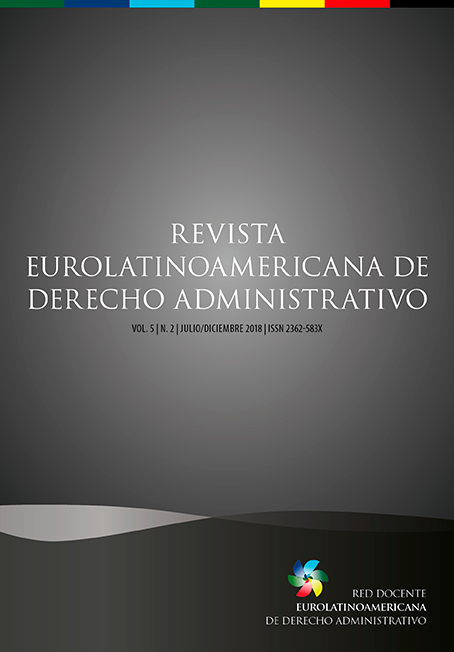Intelligent Public Administration: news to the digital regulatory ecosystem of the Argentine Republic
DOI:
https://doi.org/10.14409/redoeda.v5i2.9094Keywords:
Argentine Republic, Public Administration, emerging technologies, artificial intelligence, regulatory frameworkAbstract
The purpose of this papper is to approach the regulatory framework that allowed the digitization of the Argentine Public Administration. First, describe the regulatory framework that allowed the digital transformation of the National Public Administration, between 2016-2017, from the incorporation of information and communication technologies. Second, the regulatory framework, between 2018-2019, from the incorporation of artificial intelligence, automation and conversational agents. Finally, highlight the application of the artificial intelligence system “Prometea” in the Public Administration and the need to enact a National Administrative Act that regulates, on the one hand, the implementation and development of intelligent systems and the powers of state officials , and on the other, the rights of people in their relationship with the National Public Administration in the age of emerging technologies.
References
CHAROSKY, Hernán, et al., La queja como energía positiva: la experiencia del concurso “El peor trámite de mi vida” en Bolivia, Washington, D.C., noviembre de 2014, https://publications.iadb.org/bitstream/handle/11319/6729/ICS_TN_La_experiencia_del_concurso_%C2%BFEl_peor_tr%C3%A1mite_de_mi_vida%C2%BF_en_Bolivia.pdf?sequence=1
CLUSELLAS, Pablo, et al., Gestión Documental Electrónica, Una transformación de raíz hacia el gobierno electrónico en la ciudad de Buenos Aires 2009-2014, 1a ed. - Ciudad Autónoma de Buenos Aires : Secretaría de Gobierno de la Ciudad de Buenos Aires, 2014, disponible en: https://www.boletinoficial.gob.ar/files/gde_version_online_0_1.pdf
CORVALÁN, Juan Gustavo., Prometea Inteligencia artificial para transformar organizaciones públicas. Edición Editorial Astrea, Universidad del Rosario, DPI Cuántico e IMODEV.2019, disponible en: https://dpicuantico.com/libros/prometea_oea.pdf
CORVALÁN, Juan Gustavo., Hacia una Administración Pública 4.0: digital y basada en inteligencia artificial. Decreto de Tramitación digital completa, Editorial La Ley, Argentina, 17 de agosto de 2018, pp. 1-19.
CORVALÁN, Juan Gustavo, Presentación Prometea: Inteligencia Artificial al Servicio de “Más derechos para más gente. Sr. Juan Gustavo Corvalán, Fiscal General Adjunto en los Contencioso Administrativo y Tributario de la República Argentina, durante el Consejo Permanente de la Organización de Estados Americanos, Miércoles 22 de Agosto de 2018, Washington DC, Texto ampliado de la conferencia, disponible en: http://scm.oas.org/pdfs/2018/CP-PRES-CORV.pdf
CORVALÁN, Juan Gustavo, Estados eficientes. La productividad del sector público bajo la lupa, Algoritmolandia. Inteligencia artificial para una integración predictiva e inclusiva de América Latina, del Banco Interamericano de Desarrollo, 1ª ed.-Ciudad Autónoma de Buenos Aires, Planeta, 2018, páginas 257-264.
CORVALÁN, Juan Gustavo, STRINGHINI, Antonella El principio del fin de la “burocracia estatal imprenta. Comentario al Decreto Nº 733/18 Tramitación digital completa, remota, simple, automática e instantánea”, Diario Administrativo DPI, Ciudad de Buenos Aires, Argentina, Año 2018, núm. 206, disponible en: https://dpicuantico.com/sitio/wp-content/uploads/2018/08/Corval%C3%A1n-y-Stringhini-Derecho-Administrativo-2.pdf
DELPIAZZO, Carlos E., Lo nuevo y lo permanente de la actuación administrativa a través del procedimiento administrativo electrónico, Editorial La Ley, 01/10/2012.
DEPARTAMENTO DE ASUNTOS ECONÓMICOS Y SOCIALES DE LAS NACIONES UNIDAS, Encuesta sobre E-Gobierno 2018, Impulsar E-Gobierno para apoyas la transformación hacia sociedades sostenibles y resilientes, Nueva York, 2018, norma disponible en: https://publicadministration.un.org/egovkb/Portals/egovkb/Documents/un/2018-Survey/E-Government%20Survey%202018_Spanish.pdf
GAMERO CASADO, Eduardo, Hacia la simplificación de los procedimientos administrativos: El procedimiento administrativo adecuado, ponencia presentada en el IX Congreso de la Asociación Española de Profesores de Derecho Administrativo Santiago de Compostela, 7 y 8 de febrero de 2014, (www.aepda.es/AEPDAAdjunto-838-Ponencia-del-Prof-Gamero-Casado.aspx)
ROSETH, Benjamin, et al., Fin del trámite eterno: ciudadanos, burocracia y gobierno digital. Banco Interamericano de Desarrollo, Junio 2018.
NACIONES UNIDAS, Departamento de economía y asuntos Sociales, Estudio de las Naciones Unidas sobre el Gobierno Electrónico, Gobierno electrónico para el pueblo Nueva York: ONU, 2012, disponible en: https://publicadministration.un.org/egovkb/Portals/egovkb/Documents/un/2012-Survey/Complete-Survey-Spanish-2012.pdf
PERRINO, Pablo E., Simplificación administrativa y reducción de cargas a los administrados. Las reformas al procedimiento administrativo nacional.
OCDE. Perspectivas de la OCDE en Ciencia, Tecnología e Innovación en América Latina 2016 (Extractos), disponible en: https://www.oecd-ilibrary.org/docserver/9789264303546-es.pdf?expires=1568896015&id=id&accname=guest&checksum=0B4FD5EE1984055085218EBEBDC9CFA7
Downloads
Published
How to Cite
Issue
Section
License
Authors who publish in this Journal agree to the following terms:
- Authors retain copyright and grant the Journal of Constitutional Research the right of first publication with the article simultaneously licensed under the Creative Commons - Attribution 4.0 International which allows sharing the work with recognition of the authors and its initial publication in this Journal.
- Authors are able to take on additional contracts separately, for non-exclusive distribution of the version of the paper published in this Journal (eg.: publishing in institutional repository or as a book), with a recognition of its initial publication in this Journal.
- Authors are allowed and encouraged to publish their work online (eg.: in institutional repositories or on their personal website) at any point before or during the submission process, as it can lead to productive exchanges, as well as increase the impact and the citation of the published work (see the Effect of Open Access).



























.png)





